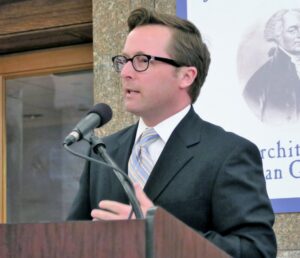 ANDREW S. CROUCH, Edward J. Duggan Award For Outstanding Service – Private Counsel. The Edward J. Duggan Award for Outstanding Service, Private Counsel is given to an Assigned Private Counsel and is named for Edward J. Duggan, who served continuously from 1940 to 1997 as a member of the Voluntary Defenders Committee, the Massachusetts Defenders Committee, and the Committee for Public Counsel Services. The award has been presented each year since 1988 to the private attorney who best represents zealous advocacy — the central principle governing the representation of indigents in Massachusetts.
ANDREW S. CROUCH, Edward J. Duggan Award For Outstanding Service – Private Counsel. The Edward J. Duggan Award for Outstanding Service, Private Counsel is given to an Assigned Private Counsel and is named for Edward J. Duggan, who served continuously from 1940 to 1997 as a member of the Voluntary Defenders Committee, the Massachusetts Defenders Committee, and the Committee for Public Counsel Services. The award has been presented each year since 1988 to the private attorney who best represents zealous advocacy — the central principle governing the representation of indigents in Massachusetts.
After law school at Hamlin in Minnesota, Andrew Crouch came to Massachusetts in 2000 for his first legal job as a clerk to the Superior Court, where he clerked for, among others, then Judge Botsford. An Appeals Court clerkship followed where Andrew was mentored by Judge Kantrowicz. From the Appeals Court Andrew dived into the District Courts, honing his trial skills by handling assigned cases in the BMC, Roxbury, Dorchester and Cambridge District Courts, and working as an associate on assigned murder cases with Attorney Steve Weymouth. From the hurly-burly of trial practice Andrew was eventually drawn back to appellate law where he could focus more deeply on cases which would have a wider impact. In 2008, Massachusetts Lawyers Weekly chose Andrew Crouch as one of 25 “Up and Coming Lawyers” for his appellate work.
Ryan Schiff, CPCS Director of Juvenile Appeals, describes Andy as “one of my heroes” saying that when he argued his first case at the Appeals Court, “my goal was to be half as good as Andy. I’m still working on it.”
Today Andrew Crouch focuses on criminal and civil appeals before the Massachusetts state and federal appellate courts, as well as administrative proceedings before the Sex Offender Registry Board. He handles CPCS murder appeals and as well as federal appeals as a member of the Criminal Justice Act panel.
Over the last several years, Andrew Crouch has made major contributions to the advancement of fairness in the law affecting registration by former sex offenders. Through his scholarship and zealous advocacy he authored compelling amicus briefs in two landmark cases. In Doe 205614 the SJC faulted the SORB for failing to consider the low rates at which women reoffend sexually. In Doe 380316 (in which the petitioner was represented by Brandon Campbell & Beth Eisenberg) the SJC raised the burden of proof for registration from “preponderance” to “clear and convincing” evidence.